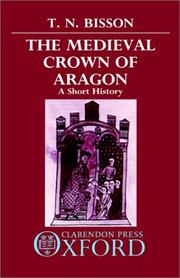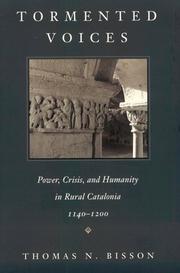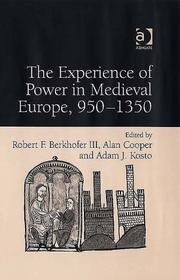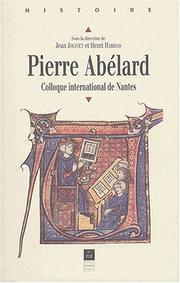| Listing 1 - 9 of 9 |
Sort by
|

ISBN: 0198219873 0191675296 1280806389 0198202369 9786610806386 Year: 1991 Publisher: Oxford Clarendon
Abstract | Keywords | Export | Availability | Bookmark
 Loading...
Loading...Choose an application
- Reference Manager
- EndNote
- RefWorks (Direct export to RefWorks)
Aragon (Spain) --- -Catalonia (Spain) --- -History --- History --- Catalonia (Spain) --- History. --- Catalonië. Geschiedenis. --- Aragon. Histoire. --- Catalogne. Histoire. --- Aragon. Geschiedenis. --- 946.52 --- 946.52 Geschiedenis van Spanje: Aragon--(reg./lok.) --- Geschiedenis van Spanje: Aragon--(reg./lok.) --- History of Spain --- anno 1200-1499 --- anno 1100-1199 --- Aragon
Book
ISBN: 9780691137087 0691137080 9780691147956 0691169764 1400874319 0691147957 9781400874316 Year: 2015 Publisher: Princeton, NJ : Princeton University Press,
Abstract | Keywords | Export | Availability | Bookmark
 Loading...
Loading...Choose an application
- Reference Manager
- EndNote
- RefWorks (Direct export to RefWorks)
Medieval civilization came of age in thunderous events like the Norman Conquest and the First Crusade. Power fell into the hands of men who imposed coercive new lordships in quest of nobility. Rethinking a familiar history, Thomas Bisson explores the circumstances that impelled knights, emperors, nobles, and churchmen to infuse lordship with social purpose.Bisson traces the origins of European government to a crisis of lordship and its resolution. King John of England was only the latest and most conspicuous in a gallery of bad lords who dominated the populace instead of ruling it. Yet, it was not so much the oppressed people as their tormentors who were in crisis. The Crisis of the Twelfth Century suggests what these violent people-and the outcries they provoked-contributed to the making of governments in kingdoms, principalities, and towns.
Twelfth century --- Power (Social sciences) --- Douzième siècle --- Pouvoir (Sciences sociales) --- Europe --- Politics and government --- History --- Politique et gouvernement --- Histoire --- Douzième siècle --- Pouvoir (sciences sociales) --- Classes supérieures --- Aristocratie --- Noblesse --- Power (Social sciences). --- History of Europe --- anno 1100-1199 --- Empowerment (Social sciences) --- Political power --- Exchange theory (Sociology) --- Political science --- Social sciences --- Sociology --- Consensus (Social sciences) --- Classes supérieures
Book
Year: 1979 Publisher: Oxford Clarendon Press
Abstract | Keywords | Export | Availability | Bookmark
 Loading...
Loading...Choose an application
- Reference Manager
- EndNote
- RefWorks (Direct export to RefWorks)
Book
Year: 1979 Publisher: Oxford Clarendon Press
Abstract | Keywords | Export | Availability | Bookmark
 Loading...
Loading...Choose an application
- Reference Manager
- EndNote
- RefWorks (Direct export to RefWorks)
Book
Year: 1979 Publisher: Oxford Clarendon Press
Abstract | Keywords | Export | Availability | Bookmark
 Loading...
Loading...Choose an application
- Reference Manager
- EndNote
- RefWorks (Direct export to RefWorks)

ISBN: 0674895282 Year: 1998 Publisher: Cambridge, Mass. London Harvard University Press
Abstract | Keywords | Export | Availability | Bookmark
 Loading...
Loading...Choose an application
- Reference Manager
- EndNote
- RefWorks (Direct export to RefWorks)
Digital
ISBN: 9781280806384 Year: 2002 Publisher: Oxford New York Oxford New York Oxford University Press Clarendon Press
Abstract | Keywords | Export | Availability | Bookmark
 Loading...
Loading...Choose an application
- Reference Manager
- EndNote
- RefWorks (Direct export to RefWorks)

ISBN: 0754651061 9780754651062 9781315239743 Year: 2005 Publisher: Aldershot Ashgate
Abstract | Keywords | Export | Availability | Bookmark
 Loading...
Loading...Choose an application
- Reference Manager
- EndNote
- RefWorks (Direct export to RefWorks)
Taking their inspiration from the work of Thomas N. Bisson, to whom the book is dedicated, the contributors to this volume explore the experience of power in medieval Europe: the experience of those who held power, those who helped them wield it, and those who felt its effects. The seventeen essays in the collection, which range geographically from England in the north to Castile in the south, and chronologically from the tenth century to the fourteenth, address a series of specific topics in institutional, social, religious, cultural, and intellectual history. Taken together, they present three distinct ways of discussing power in a medieval historical context: uses of power, relations of power, and discourses of power. The collection thus examines not only the operational and social aspects of power, but also power as a contested category within the medieval world. The Experience of Power suggests new and fruitful ways of understanding and studying power in the Middle Ages.
Power (Social sciences) --- Middle Ages --- Pouvoir (Sciences sociales) --- Moyen Age --- History --- History. --- Histoire --- Europe --- Politics and government --- Politique et gouvernement --- Middle Ages. --- Empowerment (Social sciences) --- Political power --- Exchange theory (Sociology) --- Political science --- Social sciences --- Sociology --- Consensus (Social sciences) --- Dark Ages --- History, Medieval --- Medieval history --- Medieval period --- World history, Medieval --- World history --- Civilization, Medieval --- Medievalism --- Renaissance --- To 1500 --- Acqui 2006 --- Social conditions


ISSN: 12552364 ISBN: 2868477771 2753525749 9782868477774 Year: 2015 Volume: *10 Publisher: Rennes : Presses universitaires de Rennes,
Abstract | Keywords | Export | Availability | Bookmark
 Loading...
Loading...Choose an application
- Reference Manager
- EndNote
- RefWorks (Direct export to RefWorks)
Théologien, logicien, dialecticien, musicologue, Abélard reste un grand savant dont l’œuvre mérite d’être étudiée et enseignée. Neuf cents ans après sa mort, sa pensée, ses travaux, les polémiques savantes qu’il a nourries avec les grandes voix de son temps continuent de fasciner les chercheurs et les érudits. Le présent recueil marque sur plusieurs points une étape nouvelle dans la connaissance de cette haute et célèbre figure. Il ouvre sur des aspects historiographiques usuellement traités, mais jamais épuisés, des perspectives et analyses originales. Par exemple, mais non uniquement, sur l’environnement historique, scolaire et religieux d’Abélard, sur sa philosophie. D’autres thèmes y sont considérablement approfondis, voire renouvelés : ainsi, les relations affectives et spirituelles à l’intérieur du couple atypique qu’Abélard forme avec Héloîse, sur sa relation paternelle à Astralabe. Une extension du dossier épistolaire y est proposée. Un ensemble de communications consacre aux planctus et aux poèmes liturgiques d’Abélard des analyses stylistiques et musicologiques. Né en 1079, au Pallet, à vingt kilomètres de Nantes, Abélard n’a jamais renié, ni même oublié ses attaches bretonnes, comme en témoignent plusieurs de ses écrits. Et même si l’essentiel de sa carrière s’est déroulé hors de Bretagne, tout justifie sans doute que se tienne à Nantes la grande conférence internationale dont ce livre constitue l’utile prolongement.
Abelard, Peter, --- Medieval literary studies --- Philosophy --- Religion --- Poetry --- Music --- 2 PETRUS ABAELARDUS --- Godsdienst. Theologie--PETRUS ABAELARDUS --- Medieval literary studies - Philosophy - Religion - Poetry - Music. --- 2 PETRUS ABAELARDUS Godsdienst. Theologie--PETRUS ABAELARDUS --- Abaelard, Peter, --- Abaelardi, Petri, --- Abaelardus, --- Abaelardus, Petrus, --- Abailard, Peter, --- Abailard, Pierre, --- Abailardus, Petrus, --- Abeilard, Pierre, --- Abélard, Pierre, --- Abelard, Piotr, --- Abelardo, --- Abelardo, Pietro, --- Abeli︠a︡r, Petr, --- Abelʹi︠a︡rd, Petr, --- אבעלאר, --- Abelard, Peter --- Congresses --- Abelard, Peter, - 1079-1142 - Congresses --- History --- biographie --- histoire de France --- théologie --- Abelard, Peter, - 1079-1142
| Listing 1 - 9 of 9 |
Sort by
|

 Search
Search Feedback
Feedback About UniCat
About UniCat  Help
Help News
News